#riverside theatre
Explore tagged Tumblr posts
Text




Riverside Theatre, Milwaukee, WI 12.13.2006 | The Bon Bons
#gerard way#ray toro#my chemical romance#mcr#black parade era#mcr riverside theatre#mcr riverside theatre 2006#mcr milwaukee#mcr milwaukee 2006#my post
526 notes
·
View notes
Text
my mom is going for a job interview at a catholic school and she's having me look up floridas ELA BEST standards and the hail mary prayer like shes cramming for a test i love her
#drgaone roars#it's okay girl.......... you're gonna be fine...... i prommy.......#20 bucks says she fumbles the prayer and gets the job anyway because she's THAT GOOD#if the other school (where we r moving) is walking-distance away from our apt we go there but if not YA BOYS GONNA GET RELIGION'D#riverside is so coooooolll im so HYPE#queer people everywhere art everywhere little restaurants and theatres and shops everywhere#this new school is Tiny and not-charter so the kids will be fewer and nicer she'll be able to actually teach and not have breakdowns#and we'll keep the new apt so clean and i can introduce myself as taz#everything is gonna get better
7 notes
·
View notes
Photo

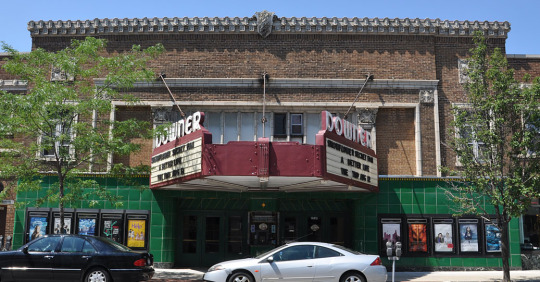
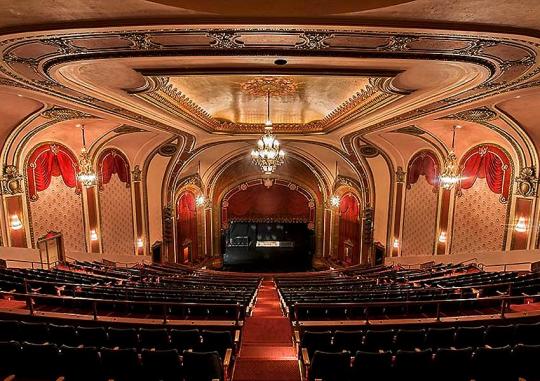
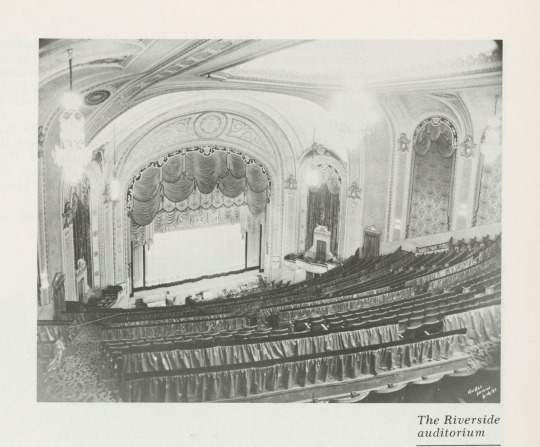
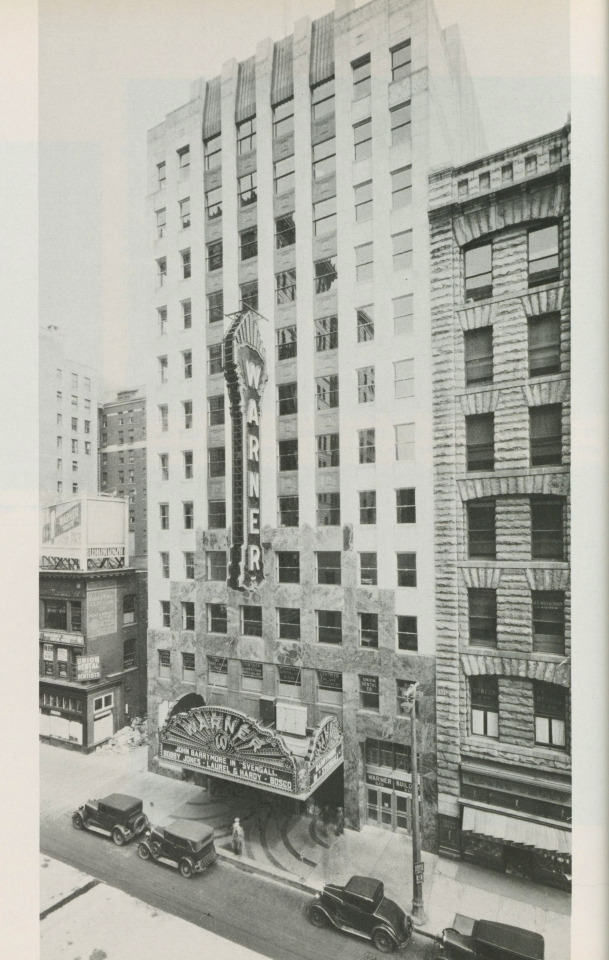

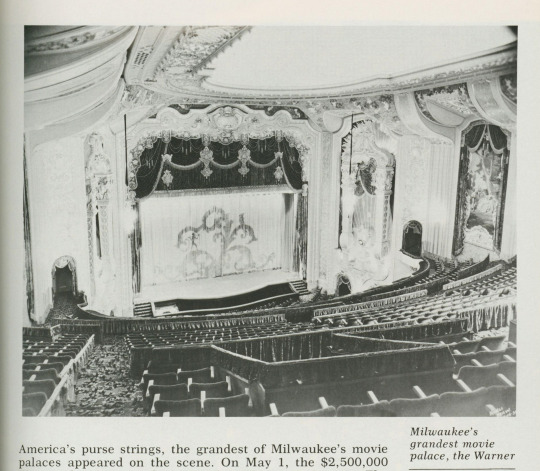

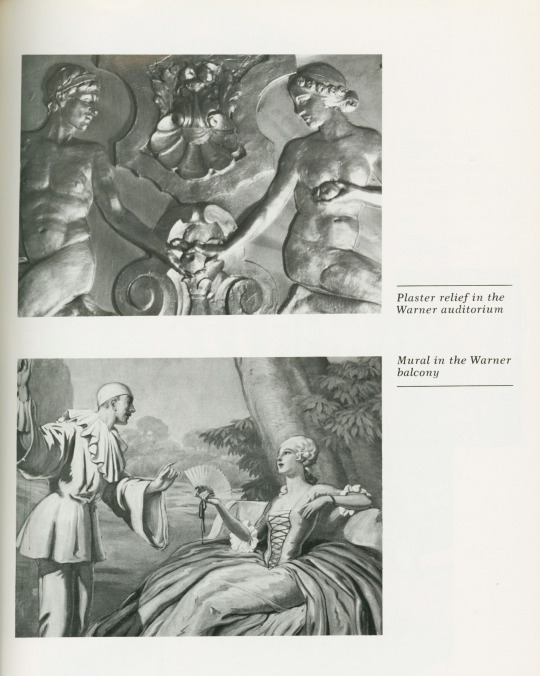

414 Day
It’s 414 Day, or Milwaukee Day! We celebrate Milwaukee on April 14 because the area code for the Milwaukee area is, you guessed it, 414! This year for 414 day we are celebrating a few of the spectacular movie palaces in Milwaukee that still act as theatres in some capacity today.
First shown here is Downer Theatre, located at 2589 N. Downer Ave on Milwaukee’s East Side. The Downer Theatre is Milwaukee’s oldest operating movie theatre in Milwaukee. It opened in 1915 and has been a movie theatre ever since! It may have a tile front now and a different marquee, but at its heart it is still a fine old movie theatre.
The second theatre shown here is the inside of Riverside Theater, located at 116 W Wisconsin Ave, opened in 1928 as a live performance center, and was a first-run movie theatre in the 1950s. Today, it is once again a live music and performance venue with a capacity of 2,450 people.
The third theatre shown here is the crème de la crème: the Warner Grand Theatre, located at 212 W. Wisconsin Ave. This theatre was opened in 1931 in place of the opulent Butterfly Theatre that once stood in its location. The theatre cost $2.5 million to build and was considered the most beautiful in the city. It continued as a movie theatre until the mid-1990s when it closed. In 2017, the Milwaukee Symphony Orchestra (MSO) purchased the theatre and renovated it back to its original glory. The theatre opened again in 2021 as the home of the MSO now called the Bradley Symphony Center, and it is gorgeous!
There are other movie palaces still in use in Milwaukee, too, like the famous Oriental Theatre on the East Side, which underwent its own renovation in recent years, and the Avalon Theater in Bay View, which offers an “atmospheric” experience with a starry sky lit in the ceiling in the main theatre.
All of the images in black and white are from Milwaukee Movie Palaces by Larry Widen and Judi Anderson, published in 1986 by Milwaukee County Historical Society.
These theatres are part of Milwaukee’s history as well as a part of their present! I highly recommend visiting any one of them for a movie or performance soon.
-- Alice, Special Collections Department Manager
#movie palaces#414 Day#Milwaukee Day#414 area code#Downer Theatre#Riverside Theater#Warner Grand Theatre#Oriental Theatre#Avalon Theater#Milwaukee#Milwaukee History#history#historical buildings#Alice
46 notes
·
View notes
Text


3 notes
·
View notes
Text
More Shows I've Seen Recently
More Shows I've Seen Recently
Another round up of shows I’ve seen recently, just while I get my ducks in order irl. t’s been a great couple of weeks for repeat visits but have managed to squeeze in a couple of new shows as well. Cabaret at the Kit Kat Klub As soon as I saw the casting announcement of Aimee Lou Wood and John McCrea as Sally Bowles and the Emcee, I knew I had to see their performances for myself. One thing I…

View On WordPress
#a streetcar named desire#cabaret#killing the cat#Kit Kat klub#marjorie prime#menier chocolate factory#phoenix theatre#riverside studios#six#vaudeville theatre
3 notes
·
View notes
Text
it’s been a few years since i’ve lived in parramatta but have any new queer bars/hot spots opened up?
#i know some of you are from or near parra#dm me if you have the hot goss#literally the only queer hot spot i can think of is riverside theatre lol
1 note
·
View note
Text
New writing by the Riverside!
A new writing night – and a pint – in London! Home of Dr Who… and others! Nick by the Riverside!
View On WordPress
0 notes
Text
Finalists revealed for Parramatta Riverside Theatres design competition
Five architectural teams have been shortlisted as finalists in a Design Excellence Competition for the $180-million redevelopment of Riverside Theatres on the banks of Sydney’s Parramatta River. The City of Parramatta approved the business case for the redevelopment in January 2023 and, in August, launched a design competition that permitted international architects and designers to be part of an…

View On WordPress
0 notes
Text
Unpacking Frontmezzjunkies's London Theatrical Trip 0f 2023
#frontmezzjunkies and his London Theatrical Trip of 2023 #NextToNormal #DrSemmelweisPlay #Vanya #FrankAndPercyPlay @BridgeTheatre #GuysAndDolls #Hamnet @NationalTheatre #TheFatherAndTheAssassin #NoisesOff #FlowersForMrsHarris #TheTimeTravellersWifeMusical
London Theatrical Trip 2023 By Ross It was one of those spontaneous but well-planned cross-Atlantic journeys, fueled by a one-show idea that blossomed into something bigger. Antonio and I (two theatre junkies of the highest order) typically would find ourselves traveling to London, meeting there for about five nights, give or take. That is after I spent one evening with a good old friend and…
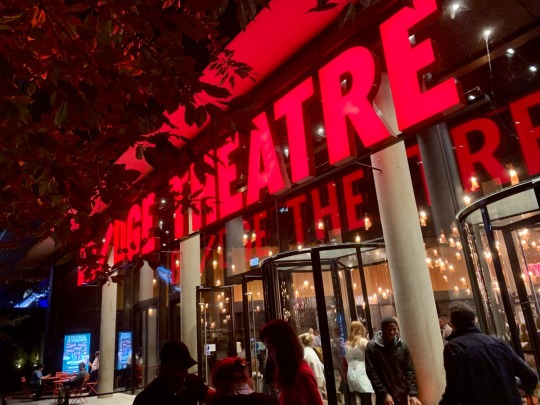
View On WordPress
#Bridge Theatre#donmar warehouse#london theatre#national theatre#Riverside Studios#The Other Palace Theatre#west end
0 notes
Text
Interview: Martin Murphy - Jonny Feathers The Rock and Roll Pigeon
Interview: Martin Murphy - Jonny Feathers The Rock and Roll Pigeon @Jonny_Feathers @rockpigeonproductions #JonnyFeathersRockAndRollPigeon
Following a critically acclaimed run at Park Theatre, Jonny Feathers The Rock and Roll Pigeon is flying down to Riverside Studios to kick off the festive season for families and little rebels using the power of rock’n’rolling. The musical with live original music brings together guitars, drums, puppets and a healthy dose of bubbles for audiences to flap and clap on a race to the biggest gig of…

View On WordPress
#Centre STage#family theatre#JonnyFeathersRockAndRollPigeon#London#Martin Murphy#Musical Theatre#Riverside Studios#Theatre#theatre blog#theatre blogger
0 notes
Text
“Happy birthday!”
“Still not my birthday, Solace.”
“Eh. One day I’ll say it and it’ll be right.”
The flowers he’s holding — pretty, ruffled deep red, although Nico doesn’t recognise them — remains extended between them, clutched fist unwavering. Nico rolls his eyes, biting the inside of his cheek, and takes them.
“Of course, you could also just tell me when your birthday is.”
“No.” A pause. He brings the flowers up to his face, pointedly ignoring Will’s wink, and inhales. They smell almost identical to the shampoo Will wears. “You’re such a loser.”
“And yet you spend all your time with me.”
“Not — all,” Nico protests, cheeks burning. “I spend —”
Time with others, he was about to say, and while it is indeed true that he does, in fact, socialize with more than one person, he realises with startling clarity that Will is almost always there.
Will grins, wide and cheeky and knowing. “Having some thoughts, there, Neeks.”
“Shut the fuck up.”
Will gasps dramatically, and when that is not enough he holds up a hand, digs a string of plastic pearls out from his many pockets, clasps them around his neck, clears his throat, and gasps even more dramatically, clutching said pearls.
Nico laughs.
Unfortunately.
But he chokes it back last minute and turns it into a weird horse noise instead, so he’s victorious, basically.
“How dare,” says Will, indeed dramatically, “how dare, di Angelo, deride me, your closest friend, in such a way —”
Nico deliberates his options. Should Will have the space unimpeded to continue on than he shall do so, with increasing gusto. At the six minute mark he will graduate to elevating himself on whatever surface makes itself available, from an infirmary stool to An Actual Roof, and project his voice to make sure that everyone suffers his Elizabethan histrionics, not just Nico (or Kayla or Austin or Lou especially Cecil or Mitchell or Piper or or or or). At the nine minute mark he will be accompanied, magically, by intense background music, because Apollo deserves all of his trauma. Nico doesn’t know what the ten minute mark will bring, but frankly he’d rather walk on hot coals with open sores on his feet than find out, so.
“— good friends, sweet friends, from this group I hail, and to such a sudden flood of mutiny! To bend to the leadborn suffering —”
When Nico gestures he is graceful, obviously. And poised. When Will gestures he narrowly avoids smacking himself square in the face nine times out of ten, and sometimes, like now, he actually does smack himself in the face, but for some reason this does not deter or embarrass him. Perhaps because he, like most Apollo children, does not actually have the part of his brain that produces shame, and such gleeful shamelessness shows in his devastatingly wide eyes. Which are, Nico notices, beginning searching for the nearest climbable surface.
Ah. Level one has been exceeded.
“Hide not thy poison with such sugar’s words —”
Drastic times, drastic measures; in time of theatre kid, regress to caveman instincts. Et cetera. Nico knows the drill. He’s a twice-adorned war hero. He understands sacrifice. He understands betrayal. He knows timing, knows difficulty. He knows the burden of doing the right thing to prevent further tragedy.
He sets his flowers delicately on the ground beside him, ties his hair back out of his face, does a couple stretches, exhales peacefully, and tackles Will to the floor.
“Shut up,” he grunts, over Will’s screeching. Will, predictably, does not shut up, moaning instead about his spleen, his spine, pausing to yell, loudly, et tu, Brutus?!, moaning about his kidneys, and then once again wallowing about Brutus and betrayal.
“Someone should take away your Riverside,” Nico says solemnly, pinching Will on the arm one last time for good measure before crawling off him.
Will remains on the floor, arm thrown over his eyes. “I would sooner live without the lungs in my chest.”
“It’s gonna be me. I’m taking away your Riverside.”
Will lifts his arm, searching to meet Nico’s eyes before pouting. It is a remarkably well-planned strategy, because he has very pretty eyes, and Nico is a flaming homosexual who is openly weak to Will’s wiles. Will, who is a shit and judging by the smirk he is barely fighting back in favour of a quivering lip, knows this.
“Don’t you love me?”
“No,” Nico lies. He forces himself away from Will’s gaze, ears burning. “Go away, you walking annoyance. I never want to see you or anything about you ever again.” He scoops up his flowers and stomps off, smiling as Will cackles.
He carries around the flowers for the rest of the day.
#this is so corny and cheesy and ridiculous#i’m in my shakespeare nerd will truther era btw#pjo#percy jackson and the olympians#hoo#heroes of olympus#nico di angelo#will solace#nico di angelo/will solace#nico/will#will/nico#nico di angelo & will solace#solangelo#pining nico di angelo#whipped nico di angelo#fluff and humour#dramatic will solace#my writing#pjo hoo toa#100 ways#100 ways to say i love you#longpost
357 notes
·
View notes
Text
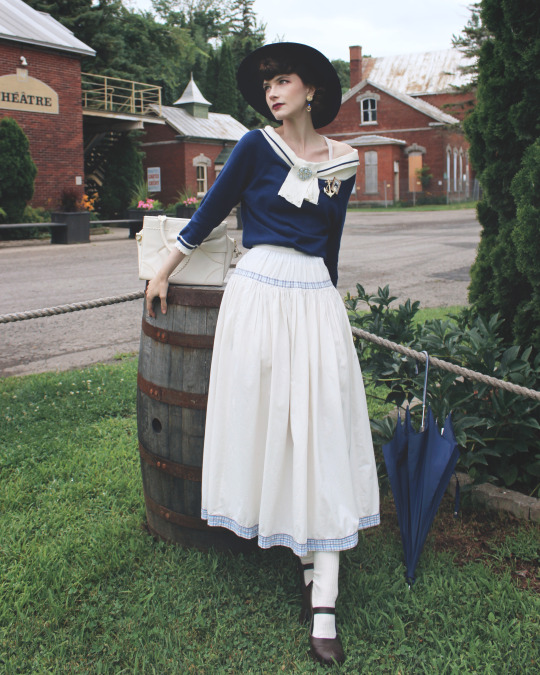
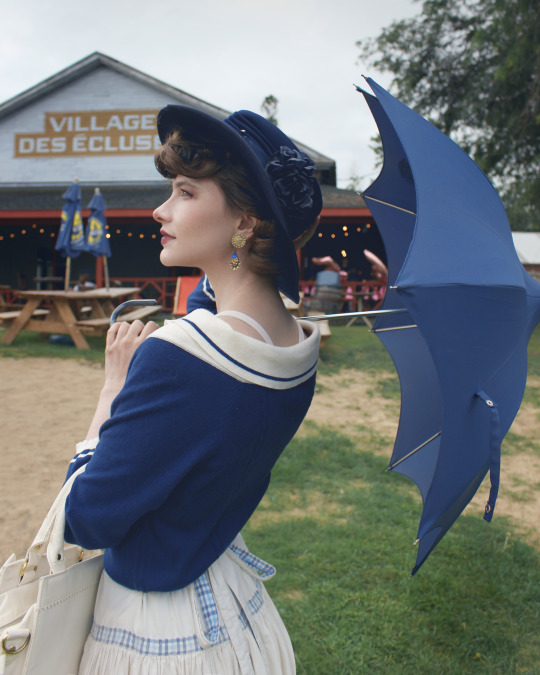
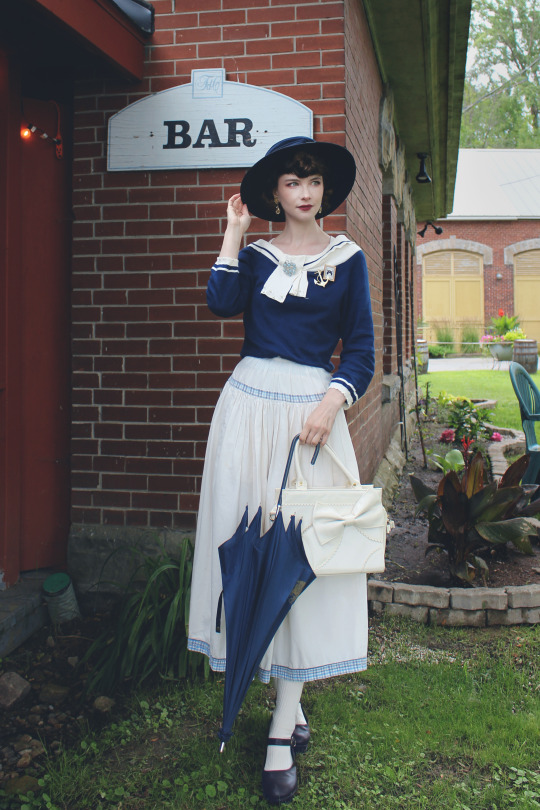
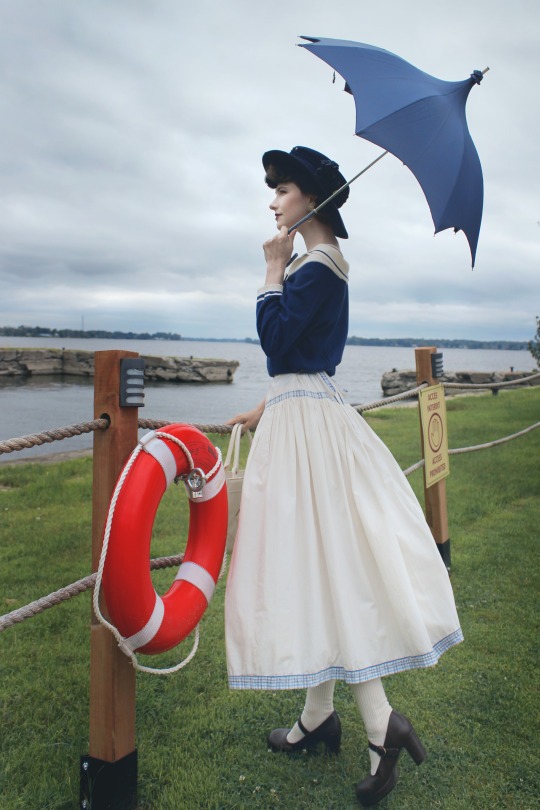
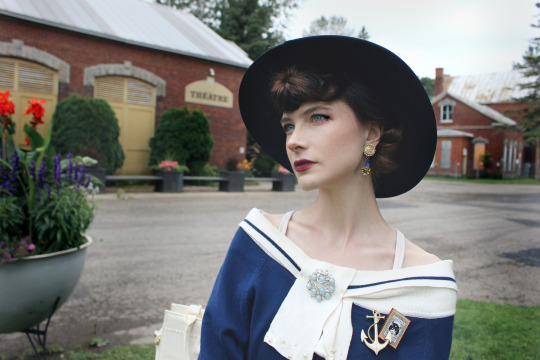
What do you mean, "I am overdressed for the beach"?
Today's little local history lesson that you won't find on any of the Village des écluses or Pointe-des-Cascades websites:
From 1900 to 1959, the Soulanges canal was where most boats would pass through to navigate the Saint-Laurent river in the area South-West of Montreal. At Pointe-des-Cascades, right next to the canal, there was an industrial site where all the maintenance materials for the canal were being built and stored, but when the canal closed in 1959, that site was left abandoned. In 1986, the site got revived, and the industrial buildings were repurposed as a summer theatre, restaurant and boutiques, and the riverside, as a small beach. However, the site was abandoned once again in the late 2010s, only to be picked up again by a new team wanting to restore the 80s resort it once was.
So, how is my 1980's does 1910's nautical outfit? I have also added a picture of my brother and I on that day, two pictures at Ste-Anne-de-Bellevue at sunset (with my sister and a different hat) and a picture of the abandoned "Hotel" (which was never a hotel) at Village des écluses, taken in April, on my Instagram post.
Outfit rundown Skirt: vintage Pink House Top: old Axes Femme Hat: vintage Shoes: old Queen Bee Parasol/umbrella (served both purposes that day): Alice and the Pirates Navy cat stamp brooch: Via Carousel All other jewellery: vintage
#fashion#vintage#vintage style#vintage fashion#vintage aesthetic#80s fashion#historybounding#pink house#jfashion#retro fashion#retro style#historical fashion#historical facts#long hairstyles#axes femme#sailor style#marine style#edwardian fashion#fanny rosie#fannyrosie
697 notes
·
View notes
Text
"Sir Ian McKellen injured himself falling off a London theatre stage a few weeks ago so he has been taking time out to recover. I am in his beautiful riverside home in east London inspecting his convalescent reading material. Breathe: Tackling the Climate Emergency by Sadiq Khan sits on top of his pile. Next down is health secretary Wes Streeting’s memoir, One Boy, Two Bills and a Fry Up. Prince Harry’s memoir, Spare, sits open on the table in front of him.
"'I’m most definitely on Harry’s side,' he says, tapping it with a finger."
37 notes
·
View notes
Text
It’s important to me that you all know that in the Riverside theatre production Demeter comforts Alonzo *and* Munkustrap after the Macavity fight
Holly Chorengel as Demeter, Matt Curtis as Alonzo, and Thomas McNeal as Munkustrap. Cats, Riverside Theatre 2006.
#cats the musical#Demeter (cats)#alonzo (cats)#munkustrap#Demelonzostrap#cats non replica#cats creekside theatre 2006
36 notes
·
View notes
Text
PSA: I found out last week that Michiru Yamane, the primary composer behind many of the game tracks in the Castlevania-verse, has a YT channel with extended versions of some of her Castlevania tracks.
Some of my faves include: - Lament of Innocence: Joachim by the Transparent Lake (aka Joachim of the Clear Blue Riverside), Garden Forgotten by Time, Ghostly Theatre - Symphony of the Night: Wandering Ghosts - Curse of Darkness: The Forest of Jigramunt, Mortvia Aqueduct - Bloodlines: Iron Blue Intention, Reincarnated Soul
Whether you're a fan of the Castlevania game franchise, video game music in general, or a fanworks creator in need of some gothic-y ambient piano music to write or draw by, it's a pretty cool thing to check out : )
#michiru yamane#castlevania#castlevania game music#lament of innocence#symphony of the night#curse of darkness#castlevania bloodlines#castlevania curse of darkness#castlevania sotn#castlevania symphony of the night#castlevania lament of innocence
88 notes
·
View notes
Text
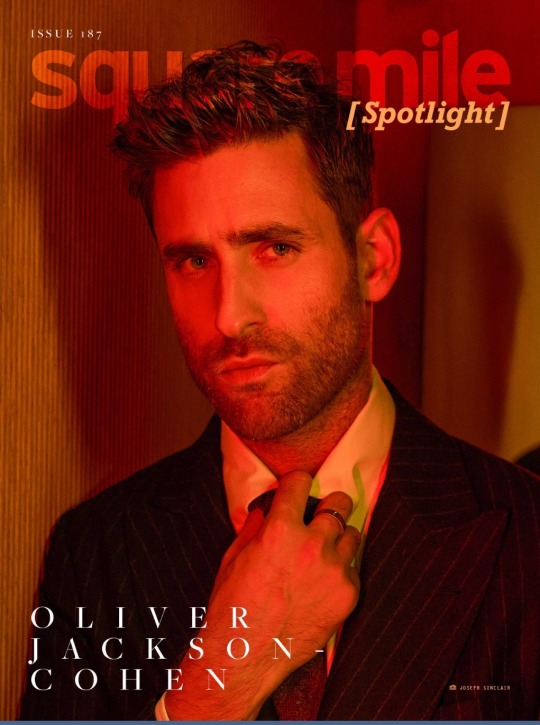
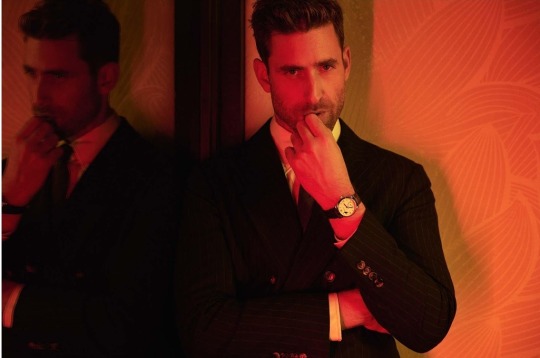

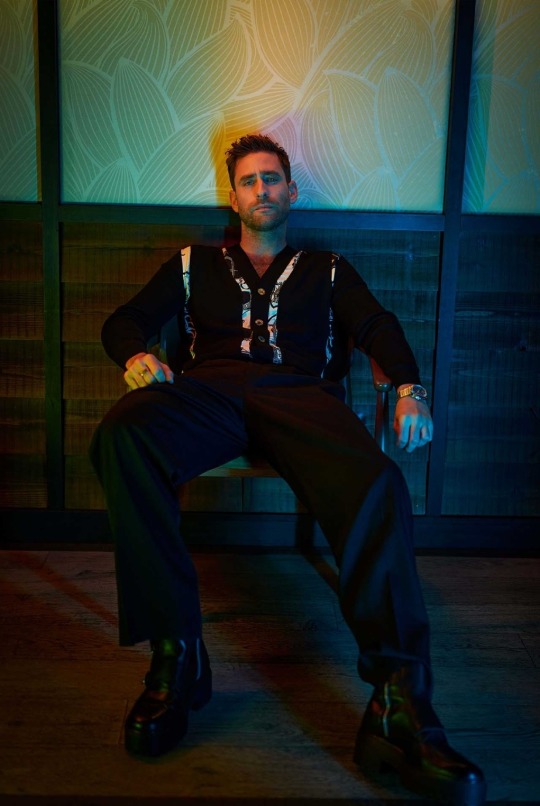
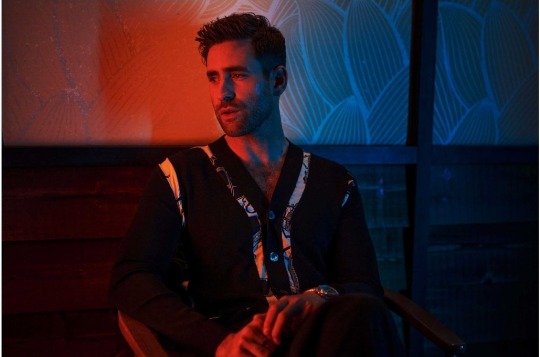

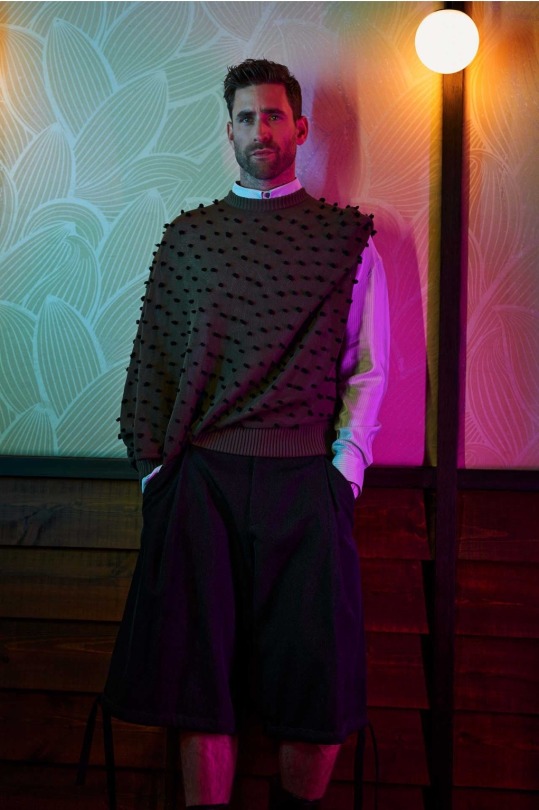

Few actors have endured as fraught a journey as Oliver Jackson-Cohen. Few actors are more in demand than the star of The Haunting of Hill House and Jackdaw
by Maeve Ryan
OLIVER JACKSON-COHEN HAS been doing this a while. He decided to act at the age of six. Joined a theatre troupe and began to climb. He continued until university but didn’t get into any drama schools. Throughout our conversation, he tells me there were no signs pointing him in this direction, no surefire chance at success. But he’s found it, and then some.
He rose to prominence with his highly acclaimed portrayal of Luke Crain in Mike Flanagan’s The Haunting of Hill House.
A character that battled a heroin addiction to cope with past traumas, though addiction was the least interesting thing about him. The show featured stars of the past, and launched new ones into the present, Oliver Jackson-Cohen being one of them. The role of Luke changed the course of his life – for more reasons than one.
It was the first time in his life he no longer had to hide, he tells me. “I could be as fragile as I felt.” He took his newfound Netflix fame and began to carve a path that finally aligned with who he was, not who the world wanted him to be.
Now, he takes centre stage in Jamie Dobb’s new film Jackdaw. When he read the script, he thought he was the last man for the job. When Dobb explained the hyper masculine lead needed someone to bring softness behind it, he signed on.
Jackson-Cohen’s career, and presence, proves that the strength of a man lies in his ability to go beyond society’s standards. He breaks the stereotypes like bread over a long conversation in Soho. We discuss his entrance into the industry, facing traumas, and finding a safe place to land.
sm: What was the first movie you ever saw that made you want to act?
o-jc: Home Alone. I remember seeing that film and saying, oh whoa, so a kid can do this? I remember telling my dad, ‘I think I want to do that.’ I was six or seven.
But it gets dark. So, my mum and dad’s house had a bay window that was on the street. And when I came home from school for a week, I just sat in the window thinking, any minute now, someone from Home Alone is going to walk past, and go, there’s a kid! Let’s get him! I was willingly wanting to get kidnapped. Which is so fucked. My dad came home and was like, ‘What are you doing?’ And then he was like, ‘Yeah, that’s not how that works.’
We found a theatre program – I started going there when I was eight. I was never the golden kid. In the drama clubs, I was always like the snake in the background. Or just the scenery. We used to put on terrible plays. I was such an insular kid. I found a safe place to feel where it’s real, but it’s not. So you can experience it all. I did that for three years, and then I was kicked out.
sm: What! Why?
oj-c: I had an attitude or something like that. I got suspended so many times. I genuinely was not looking for trouble. I was always the one to get caught. Like, I was the kid who someone handed the knife to, and I’d be standing above the dead body, and then the next thing I knew it was 20 years in prison. It was always stuff like that. But it was time to move on anyway.
I found this drama school at Riverside Studios. It was a small group, maybe eight or nine people. It was so interesting, because I’m going to do a gross name drop, but in the group was Carey Mulligan and Imogen Poots. It was incredible.
sm: Those were the kids that were just there? Did you have to audition?
oj-c: No, but I did a trial. It was a lot of devised stuff, like improv. A guy named Andrew Bradford ran it. He really supported kids. It was all day Saturday. We were all teenagers. It felt like another life. It grew and grew and by the time I left I was 17 or 18. It wasn’t one of those places that you were beaten down. No fake bullshit. It was a safe place to try stuff. We’d put on plays and we all got agents from that as kids.
sm: Is that the moment you look back on and think of as the beginning?
oj-c: I think so. But it was such a long period of time. Career wise, it was quite stagnant. I did one job when I was 15 that was some late night soap. Then I didn’t do anything until I was 18. I wasn’t like this is real until later. It started to snowball when I finished school. I went to get a French lit degree, hated it, dropped out, and applied to drama school. I didn’t get in anywhere.
In the meantime, there was a job at the BBC for a silly period drama. I did that, took the money, and went to do a foundation in New York at Strasberg.
sm: Tell me about the audition for drama school. You didn’t get in anywhere?
oj-c: Yes. I’m telling you there were no signs that pointed to me saying, yeah, you’re quite good at this. It felt like everyone was saying, ‘don’t do it.’ Which is a really interesting place to start from. If no one around me believes in me, how do I? And I just keep going? It was a mix of delusion and stupidity.
sm: Did you think about doing something else?
oj-c: When I was still in high school, I worked as a runner on productions, mainly at the BBC. I was revolving through that so when I finished school, that was kinda my job.. I got to see the inner workings of how sets worked, rehearsal periods. I got to see the writers and the actors, how they would construct a joke, and adjust things.
When I was 17, I started doing the European Music Awards. I would go and work in the costume department, I didn’t fucking know anything about how to sew on a bun but it was amazing. I got such a solid understanding of how a production office works, how a schedule works.
Tragically, you see a lot of how an actor is a small cog in this machine. Everyone is working so diligently. This whole idea of superiority that can go on, it was important for me to witness early on. Because when you go onto set and someone says five minutes, it actually means five minutes. But it was also hard because I was watching people do what I love. I didn’t get into school, so I said fuck it, I’m gonna do a foundation for a year and reapply to drama school from New York.
sm: Why choose the Strasberg program?
oj-c: Someone told me about it. I thought I needed to go do something that gives me a playground, a space in the meantime. But when I got there, I was with this small agency, and they started sending me out on auditions. The first or second one I went on, they flew me to LA to do a screen test and I got it. This was six weeks into the program. I was like: what do I do?
sm: What did you decide?
oj-c: There were three or four movies I got, but then the financial crash happened and it all fell apart. So I went back to New York to continue with the program. But meanwhile, I had been signed to WME and my agents were like, let’s go down the studio route because that’s going to be fun. I got an audition for this Drew Barrymore movie, got that, and then I dropped out. Then got another job that moved me to LA. I was there for a year shooting and doing the prep for that.
The whole idea was that I’d do that and reapply to drama school. Then I kept on booking. It’s only in the past couple years I was like, thank fuck I didn’t stop. There were moments that I thought I needed to stop and do three years of training.
sm: Did you feel like you were missing something that other people had?
oj-c: I felt like I was back-footed. Like I had no idea what I was doing, then I realised no one does. There is no arrival point where you’re like, ‘I know how to act!’ A lot of it was becoming comfortable with learning and making mistakes. Some will hurt and some don’t matter.
sm: So you start booking jobs, and then it just keeps going? No break?
oj-c: There’s obviously periods where you’re out of work. Or you really want a job and you do 50 auditions for it and you don’t get it. A lot of that went on. But I was 22. I ended up staying in New York until I was 28. I felt like a deer in the headlights. I was just so grateful that I was working and that people wanted to hire me that I never stopped to ask if it was actually fulfilling.
I listened to a lot of people early on. I needed guidance. I needed someone to say, do this job, this will lead to this, or it’s important you work with this person. Then I woke up one day and was like, is there anything here that I’m actually proud of?
That comes with experience and maybe a little bit of delusional confidence where you go, I think I want to try and do something here that is more aligned with me. It was a weird time to be in LA. I’m six foot three. I look a certain way. People wanted the product. I thought that was how I’d get there. I’ll pretend to be confident, I’ll be a version of what these people want. Keep my mouth shut and pretend. I reached a point where I was like, I cannot keep going this way.
sm: Did you feel that you’d abandoned yourself? Or was it a slow realisation?
oj-c: It became harder and harder to pretend to be this chill guy. I’m not chill. But when you’re handed something, you go, this is fun. Then the more you read and become accustomed to the environment you’re in, you start to feel entitled to have an opinion. To feel entitled enough to say: I actually don’t like this, I actually find this quite soul destroying. Having to make myself small, or block myself off and not be as vulnerable as I feel. To not show that.
It was an interesting time – in the late 2000s, men were men and what I was being asked to do was be an idea of what a tall, white, masculine man was that sort of never really sat. I actually feel really fragile. So I took a break for six months. I was like, I’m just going to say no now and try to re-shape the direction of what I want to do. Then The Haunting of Hill House came along.
sm: How did that audition happen?
oj-c: I’d done a film with the producer before. They sent me a conversation that happens in the show between Luke and his twin sister, it was him asking her to get him drugs. They asked me to read that and literally the following day, they called me and were like yep, you.
means something to people. It was an amazing thing to be a part of.
sm: Did you immediately recognise that Luke was the kind of character you were looking to play on the page?
oj-c: Sort of. If I’m honest, I did quite a lot with the role. Mike was very open to collaborating. I put a lot of stuff in there that wasn’t necessarily there originally.
All of the siblings were there but they were sort of blank canvases for anyone to put whatever they needed to put in it. We all came in and made bigger choices to create this family dynamic. They brought on this incredible writer, Scott Kosar, who wrote The Machinist, to tackle the Luke character because he was in recovery at the time.
sm: The writer was in recovery?
oj-c: Yes. He tackled all those monologues about staying clean and everything. That was him. You know, you’re talking about a family that lived in a haunted house, that’s sort of a silly premise but all the substitutions that everyone did, it was all about trauma. Living and being followed by things unless you face them.
sm: What did you bring to the Luke character that wouldn’t have been there if somebody else played it?
oj-c: Someone else would have brought something amazing to it. But Mike Flanagan had so many tapes come through of people playing the addiction, and you can’t play the addiction. When I first looked at Luke I was like, okay, he’s a heroin addict, but then I was like, actually, to put a label on that, to label him, does such a disservice.
So it became about what he was running from, and what was terrorising him. For me, it became about childhood sexual abuse. How do you escape this thing you don’t want to feel? And if you can’t keep it at bay, it will take over. It became about that struggle, not ‘I need my fix.’ It became about this terrorising thing that’s always present, which translates into the show. We all have things that follow us. It became about trying to humanise it and make it real by using that as a way in.
sm: You’ve been open on social media about the sexual abuse you faced as a child. How did you navigate acting something so close to home?
oj-c: I’m of the school of thought: use whatever is real for you. That’s why I do the job. A lot of us use our own personal experience, but we bring it to a safe space where it’s okay for us to experience it. In a way it calls for that, and it felt important to do for the show.
I come back to this idea of needing to stop and reassess what I wanted to do, where I wanted to go, and what I wanted to say in the work that I do. I felt like I couldn’t keep hiding. We’re all complicated, we’ve all had complicated upbringings. That’s just part of life. It’s unfortunate, but it’s sort of always going to be a mess. I needed to put everything that I felt into something. I do that all the time.
We use the parts of yourselves. Including the darker parts, and some of the stuff we don’t want to look at. I’ve never been one of those people to go half on something. You either do it or you don’t. There’s no middle ground. I’m not going to half step in, or pretend.
sm: Did you have any practices while filming to help you not carry the hurt from that world into your own?
oj-c: What was interesting was that all of that sadness was in there anyway. I wasn’t generating any of it, I was just opening it up. I didn’t whip myself up into a frenzy. It just felt like I didn’t have to hide, or pretend it wasn’t there.
sm: Would you say acting has been healing for you?
oj-c: I don’t think the word healing is correct. But it’s been incredibly helpful in helping me understand myself better. It’s probably not the healthiest but I’ve said this before, I feel like I need the job to lay out all my neuroses and vulnerability. I keep myself so closed off in real life. It’s an outlet that feels necessary. That’s why I go off to work every couple days.
sm: You are cast in a lot of thrillers and horrors. Why do you think you mesh well with that genre as an actor?
oj-c: You know, after I did Haunting of Hill House, it was sort of this big thing where the amount of horror scripts that came through was crazy. The amount of, ‘do you want to play a drug addict?’ It’s incredible how desperate people are to put us into boxes.
After Hill House, I did The Invisible Man. That was a horror but the messaging - we’re talking about gaslighting, we’re talking about toxic relationships to an extreme. It was so much more than a scary film. It felt like it had something to say. That’s the thing about horror. When it’s done well, it’s incredibly impactful.
sm: After Hill House, did you feel you had agency when choosing your roles?
oj-c: To a certain extent. But no matter where you’re at: the job you want, they don’t want you. You can be Julianne Moore, but they’d rather have someone else. It’s constant. But it did change quite a lot. In terms of becoming Netflix famous, which is the strangest, most intense thing ever because you’re the most famous person on the planet and then something else comes out. I felt like I was in a fortunate space where I could choose more, but there were films that I really wanted that I didn’t get.
sm: I heard that when you first read the Jackdaw script, you didn’t think you were right for the role?
oj-c: Yes. I called the director Jamie Childs and told him he was nuts. Because again, here’s this hyper masculine man that felt quite robotic on the page. I met Jamie on the set of Wilderness. He was telling me, ‘I’ve written this movie. I’d love to get your feedback on it.’ So I read it. It was still an early draft. Then he said, ‘Do you want to do it?’ I genuinely thought I wasn’t the right fit. I thought it was just out of convenience that he wanted me.
He said to me, ‘It needs someone to come in and make it human. To give it vulnerability.’ He said the film is about how this man readjusts his life following the death of his mum, and I was like, sold! You need some tears? I’ll bring you tears! I’m never leaving my sad boy era. It happened so quickly. We wrapped Wilderness, and then started filming three and a half weeks later. We were up north in January.
sm: You go swimming in the North Sea quite a bit in the film…
oj-c: Oh yeah. It got to like minus nine. It ended with me getting hypothermia. I think I’m a bit too delicate, that’s why. I had this amazing stunt guy called Jamie Dobbs who’s this gold motor-cross champion, and we had to shoot all this stuff of us in the night. They’d get me on a rig, and then they’d get Jamie and it got to minus 12. He got frostbite on his face. It was unbelievable. It was all night shoots. I am so surprised we all made it out alive.
sm: Had you ever cold plunged before?
oj-c: Not at all. I’m one of those people in August that’s like, I don’t know if I want to go in the sea, it looks a bit cold. We did three days on the water. Some of it was in a kayak. The underwater stuff, that’s where it got brutal. We were all eating every 25 minutes because we were so cold. There was a boat just for food. I couldn’t name one thing we ate. It was just fuel. We were going to work at 5pm, and then wrapping in the morning.
sm: Do you often try new things on film sets that you’d never do otherwise?
oj-c: Yes, all the time! That’s part of the allure of it. You get to learn all these weird things that you’d never do. You get to experience these amazing things. I’ve been doing this for so long, because I’m 150 years old, and someone will bring something up and I’ll be like, oh I’ve done that! But then I’m like wait no I didn’t, the character did.
sm: Was there anything else you learned on the set of Jackdaw? Motorcross?
oj-c: Yes! I fucking loved it. If I’m honest, a lot of it is me jumping on and starting up and then getting out of frame. Insurance-wise, I couldn’t do any of the jumps or anything. But it is so great. There is nothing quite like it.
sm: Do you ever think you’ll get into the writing side of film?
oj-c: I have. I just don’t know what I have to say yet. Everyone reaches a point where they think, I don’t want to forever be a product. It would be nice to be part of the creative. I have a lot of opinions.
You go into a job with the best intentions. This is what they’ve told us, this is what’s been sold and then you’ll see the final product and be like: that’s not at all what I thought it would be. The more you do it, the more you feel like you know what you actually like and what you want to be part of. I’ll get to it at some point.
Jackdaw is in cinemas now.
#oliver jackson-cohen#oliver jackson cohen#jackdaw#jackdaw film#jamie childs#2024#interview#cw: csa#mike flanagan#haunting of hill house#luke crain#jack dawson#i have that home alone anecdote memorised by now 😭#he writes!
93 notes
·
View notes